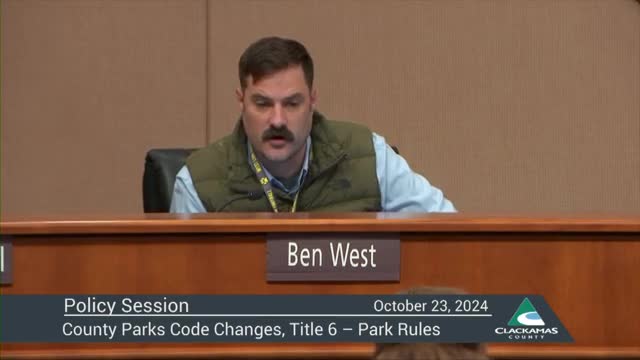Clackamas County Commissioners advance new park rule changes through formal approval process
This article was created by AI summarizing key points discussed. AI makes mistakes, so for full details and context, please refer to the video of the full meeting. Please report any errors so we can fix them. Report an error »

The Clackamas County Policy Session held on October 23, 2024, focused on proposed changes to park rules and regulations, with discussions centering on camping practices and capacity management at county parks.
The meeting began with a discussion about the flexibility of camping arrangements. A participant raised concerns regarding restrictions on RV hookups and tent camping, emphasizing the need for recreational freedom once a site is paid for. The discussion highlighted the importance of not over-regulating recreational activities, with a particular focus on alcohol usage in day-use areas. It was noted that alcohol is generally prohibited unless a special permit is obtained.
The session also addressed capacity issues at various parks. It was confirmed that some sites, like those at Metzler Park, would see an increase in capacity, while others would be reduced to align with utility system capabilities. The management of vehicle parking was discussed, with a limit of two cars per site and the availability of overflow parking to accommodate additional vehicles.
Following these discussions, the commissioners moved to advance proposed changes to Clackamas County Code Title 6, which governs park rules. The motion included provisions for two public hearings spaced at least 13 days apart, with the changes taking effect 90 days after final approval. The motion received unanimous support from the commissioners.
In conclusion, the meeting underscored the county's commitment to balancing recreational freedom with responsible management of park resources. The next steps involve gathering further information and scheduling public hearings to finalize the proposed changes.
The meeting began with a discussion about the flexibility of camping arrangements. A participant raised concerns regarding restrictions on RV hookups and tent camping, emphasizing the need for recreational freedom once a site is paid for. The discussion highlighted the importance of not over-regulating recreational activities, with a particular focus on alcohol usage in day-use areas. It was noted that alcohol is generally prohibited unless a special permit is obtained.
The session also addressed capacity issues at various parks. It was confirmed that some sites, like those at Metzler Park, would see an increase in capacity, while others would be reduced to align with utility system capabilities. The management of vehicle parking was discussed, with a limit of two cars per site and the availability of overflow parking to accommodate additional vehicles.
Following these discussions, the commissioners moved to advance proposed changes to Clackamas County Code Title 6, which governs park rules. The motion included provisions for two public hearings spaced at least 13 days apart, with the changes taking effect 90 days after final approval. The motion received unanimous support from the commissioners.
In conclusion, the meeting underscored the county's commitment to balancing recreational freedom with responsible management of park resources. The next steps involve gathering further information and scheduling public hearings to finalize the proposed changes.
View full meeting
This article is based on a recent meeting—watch the full video and explore the complete transcript for deeper insights into the discussion.
View full meeting